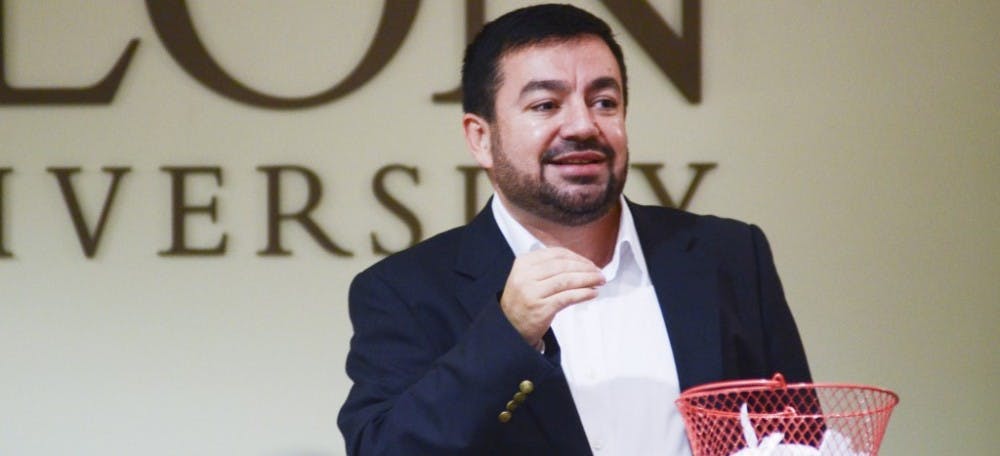No question was off-limits to those gathered in Moseley Center’s Oak Room for “Some Real Talk with the Imam,” which invited members of the Elon community to receive clarification on common misconceptions about Islam.
The event, hosted by Better Together, also offered a space for students to learn about the history and theology of the religion from Imam Abdullah Antepli, Muslim chaplain at Duke University.
“It is the social homework of Americans to understand Islam as a religion and to understand Muslims as people,” Antepli said.
[quote]A healthy society usually reflects the best of a religion, but an unhealthy society usually reflects the worst of it. -Imam Abdullah Antepli[/quote]
After providing an overview of the Islamic faith, Antepli answered questions from the audience, including anonymously written submissions collected at the start of the event Oct. 24.
The first question of the night asked about the role of violence in the Quran and in the Islamic faith.
“No religion becomes a source of violence just through theology,” Antepli said. “The theology becomes a source of violence only after it merges with other political, historical, cultural and social views.”
Antepli was also asked to explain the exclusion of non-Islamic religions in many Muslim countries.
This exclusion is not an ordinance of Islamic tradition, but is a product of culture and society, according to Antepli.
“To say Islam is essentially inclusive or exclusive is wrong from the get go,” Antepli said. “A healthy society usually reflects the best of a religion, but an unhealthy society usually reflects the worst of it.”
Towards the end of the event, Antepli was asked to address his personal experiences with discrimination. His own experiences have motivated Antepli to seek opportunities to speak openly about his faith and erase misconceptions, he said.
The prevalence of misconceptions in society inspired Better Together to host this event, according to the organization’s president, junior Mason Sklut.
“In the media you hear things about Islam that can be quite incorrect,” Sklut said. “This is an environment where people can ask questions about Islam and get an accurate answer from someone who is of the faith.”
Sklut aimed to create an environment for individuals to ask questions that might not have been welcomed in another setting, according to Sklut.
“The purpose of Real Talk when we first came up with it was to create an environment where people feel comfortable to have real talk without any political correctness,” Sklut said. “Americans are so afraid of offending others that we often miss opportunities to learn something.”
It is important for students to take advantage of these opportunities in order to help spread accurate information across campus, Sklut said.
“Our goal is for students who attend this event to pass on what they learn so that if someone is talking about Islam and misrepresenting it, students will know what to say in response,” he said.
The event was the second “Real Talk” session held since Better Together’s founding last spring. Sklut hopes to continue the tradition on a bi-annual basis and include speakers from a variety of religious backgrounds, he said.
Sklut said he hopes to increase the number of students who attend. He estimated about 30 to 40 students were present at the lecture.
“It would be ideal to maintain this as a trademark event,” he said. “Hopefully it will continue to grow, and we’ll one day have an audience of 100.”


